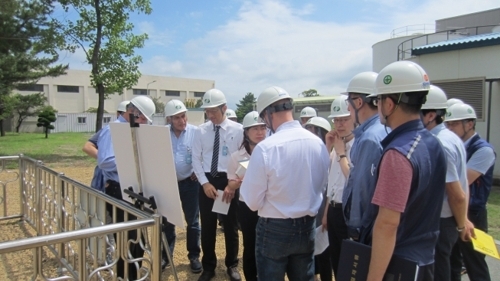The International Atomic Energy Agency said Friday it has recently carried out a safety check on two nuclear power plants in southeastern South Korea following an earthquake there last year.
In September 2016, a 5.8-magnitude temblor struck the historic city of Gyeongju, 371 kilometers southeast of Seoul, where the Wolsong and Sinh-Wolsong nuclear power stations are located.
The UN nuclear watchdog said a five-member delegation visited the atomic power plants and its operator, the Korea Hydro & Nuclear Power Co., last week to assess their measures to improve safety in the wake of the quake.

The five-day inspection, which was conducted at the request of the Seoul government, focused on the outcome of KHNP's own safety check, its quake risk assessment and technological grounds for its method of analysis.
The UN body said it had been deeply impressed by specific measures taken by KHNP and the South Korean government to improve persistently the safety of nuclear reactors against natural disasters as well as their positive attitude.
The Seoul government has a national-level plan to assess the risk of earthquakes, which enables the nuclear plant operator to update information on natural disasters affecting each nuclear power station, the IAEA said.
However, the nuclear watchdog advised South Korea to make its risk assessment method better match its safety guidelines.
The KHNP said it will map out an action plan to implement the recommendation. The IAEA plans to convey the result of its inspection to the South Korean government within three months.
South Korea currently operates 23 nuclear reactors, generating about 30 percent of the country's total power supply. (Yonhap)



![[AtoZ into Korean mind] Humor in Korea: Navigating the line between what's funny and not](http://res.heraldm.com/phpwas/restmb_idxmake.php?idx=644&simg=/content/image/2024/04/22/20240422050642_0.jpg&u=)
![[Exclusive] Korean military set to ban iPhones over 'security' concerns](http://res.heraldm.com/phpwas/restmb_idxmake.php?idx=644&simg=/content/image/2024/04/23/20240423050599_0.jpg&u=20240423183955)


![[Graphic News] 77% of young Koreans still financially dependent](http://res.heraldm.com/phpwas/restmb_idxmake.php?idx=644&simg=/content/image/2024/04/22/20240422050762_0.gif&u=)

![[Herald Interview] Why Toss invited hackers to penetrate its system](http://res.heraldm.com/phpwas/restmb_idxmake.php?idx=644&simg=/content/image/2024/04/22/20240422050569_0.jpg&u=20240422150649)






![[Exclusive] Korean military to ban iPhones over security issues](http://res.heraldm.com/phpwas/restmb_idxmake.php?idx=652&simg=/content/image/2024/04/23/20240423050599_0.jpg&u=20240423183955)



![[Today’s K-pop] Ateez confirms US tour details](http://res.heraldm.com/phpwas/restmb_idxmake.php?idx=642&simg=/content/image/2024/04/23/20240423050700_0.jpg&u=)